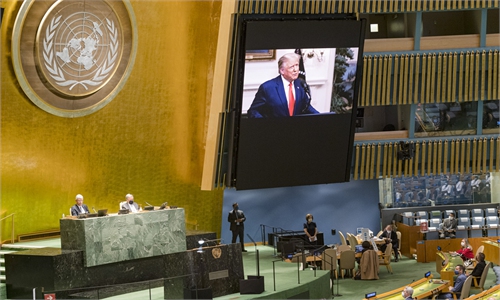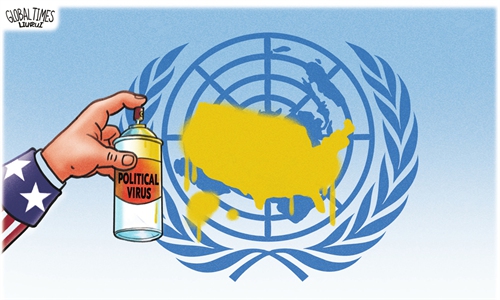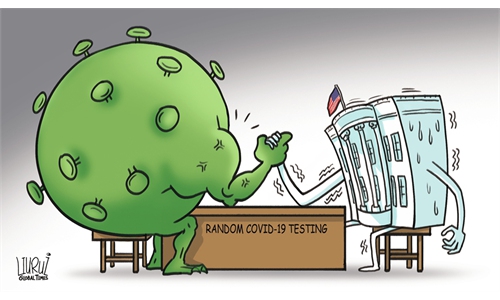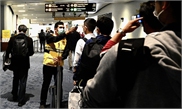'We lied, we cheated, we stole', ‘the Glory of American experiment’ by US Secretary of State/Ex-CIA director Mike Pompeo
Strong words are being hurled at each other but there is calibration in the cursing.
THERE’S this memorable anecdote in Mario Puzo’s crime classic, The Godfather, where the mafia don from New York sends his henchman to reason with a Hollywood mogul who is standing in the way of his godson getting a film role perfect for him in every way, except that he has alienated the studio big shot who now hates his guts.
Where words fail, more potent nudges are sometimes needed – in this case, a horse’s head placed in the studio chief’s bedroom while he is asleep, blood and reedy tendons included, did the trick. It persuaded the man that the favour requested, and declined, is serious business. And thus he yields, shouting invectives and threats at the actor and his Italian origins, the consigliere who had reached out to him with the initial contact on behalf of his boss, and the mafia.
But not a word against the Godfather, himself. Genius, writes Puzo, has its rewards.
There’s no special genius, and even less reward, in the acrimonious exchanges that are causing a tailspin in ties between the world’s two biggest military powers and economies.
If anything, it bespeaks dangerous brinkmanship as a once-overwhelmingly dominant hegemon confronts a resolute challenger now picking a cue or two from its own playbook on how to throw weight around.
Nevertheless, the curses the movie mogul held back from uttering came to mind as I checked around the region about the goings-on at the Asean Ministerial Meeting and related meetings with dialogue partners hosted earlier this month by Vietnam.
Perhaps the two warring sides were mildly cramped by the fact that the conference did not take place in a single hall but over video link. Even so, while both the United States and China did robustly put forth their positions, each seemed to be taking care to keep the attacks from getting too immoderate.
Indeed, the rare frisson, according to Asian diplomats privy to the talks, came when China’s Vice-Foreign Minister Luo Zhaohui, standing in for Foreign Minister Wang Yi, dropped an acid comment about “drunken elephants in the room”.
Faint light at the end of the dark tunnel of US-China ties? Maybe not. But then again, maybe.
Some cultures, particularly in Asia, teach their young that even insults have to be measured; if you spit up at a person high above you, the mucus falls back on yourself. If you do that to someone far below you, it is a waste of time to descend so low. Insults have to be exchanged between equals. But most important of all, never insult so completely that the door to a reconciliation is closed forever. Perhaps that’s what we are witnessing.
A real estate and casino mogul before he ran for his first elected office, which happened to be the US presidency, the New York-born and raised Donald Trump, whose most trusted counsel is close family, has ordered his administration to pile on his strategic adversary the most intense pressure seen in a halfcentury. Secretary of State Mike Pompeo has enthusiastically fallen in line, as have his key deputies, including Max Pottinger. Other arms of US government such as the Pentagon have fallen in line as well.
In July, two aircraft carrier groups led by the USS Nimitz and USS Ronald Reagan conducted war games in the South China Sea, joined by subsurface vessels and nuclear-armed bombers. Technology links built up over decades are being torn apart like the wanton act of a child and within the US, the Federal Bureau of Investigation is putting Chinese nationals and Americans of Chinese ethnicity under unprecedented scrutiny.
Trump’s long arm has even snatched Meng Wanzhou, the powerful daughter of the Huawei founder, one of China’s most respected tech tycoons.
Chinese diplomats and media have pushed back, and unfeelingly for a nation where the virus was first identified, sometimes suggesting that the US could learn a lesson or two from Beijing on how to control a pandemic. Also mocked at have been the racial tensions and the rioting that have scarred the US in the wake of the pandemic and the resultant economic hardship.
Nevertheless, through it all, most of the US vitriol has targeted the Chinese Communist Party (CCP), not the Chinese nation.
In a landmark speech in July at the Nixon Presidential Library, Pompeo declared that the “free world must triumph over this new tyranny”. At the Asean forum earlier this month, he underlined US “commitment to speak out in the face of the Chinese Communist Party’s escalating aggression and threats to sovereign nations”.
This week, Assistant Secretary of State for East Asian and Pacific Affairs David Stilwell began his testimony to the Senate Foreign Relations Committee by saying he was there to “discuss the threat posed by the Chinese Communist Party to the US and the global order” in three geographical regions, before going on to say that “it is now clear to us, and to more and more countries around the world, that the CCP under general secretary Xi Jinping... seeks to disrupt and reshape the international environment around the narrow self-centred interests and authoritarian values of a single beneficiary, the Chinese Communist Party”.
Just as the US has tried to separate the CCP from the Chinese people, Trump and Xi have been careful to not throw barbs directly at each other.
Indeed, Trump has claimed to have a “tremendous relationship” with Xi and he has described Xi as a “man who truly loves his country” and is “extremely capable”. He has also stressed that the two will be friends “no matter what happens with our dispute on trade”, and he also has spoken of his liking and “great respect” for China. On the other side, Chinese anger seems to be largely directed at Pompeo, rather than his boss.
At a recent panel discussion I moderated for the FutureChina Global Forum, I asked Professor Randall Kroszner, former member of the board of governors of the Federal Reserve System and who currently serves on the advisory board of the Paulson Institute, which works to promote US-China ties, whether he saw wiggle room for a patch-up after the election.
“Ultimately, there’s an understanding that major economic and military powers need to have connections, need to be able to talk and work with each other,” Prof Kroszner responded.
“There is a lot of manoeuvring and posturing that’s going on right now, but I don’t think anyone wants to burn any bridges. They want to make sure the bridges are still there, even if there are some blockades now.
“(That said) I don’t see those obstacles being removed right now.”
For now, of course, it does look as though things will get worse before they get better.
In July, the US shifted position on the South China Sea, proclaiming that it held as illegal all of China’s claims outside its territorial waters. This has emboldened some, Vietnam and the Philippines particularly, to be more assertive with China over the South China Sea dispute.
Still, some in Asean suspect a certain fakery in all this, a sense that a lot of the noise coming from the US is mere posturing. There are few illusions about China either.
Indeed, the lull in assertive Chinese behaviour in the South China Sea witnessed in the lead-up to the Asean ministerial meet and forums is generally seen as nothing more than temporary easing of pressure to get a “good meeting”.
Malaysian Foreign Minister Hishammuddin Hussein spoke for many when he said the South China Sea issue “must be managed and resolved in a rational manner” and Asean has to “look at all avenues, all approaches, to ensure our region is not complicated further by other powers”.
Indeed, some even think Trump is capable of doing a deal with Beijing the week after election day, should he win.
Already, the latest iteration of the TikTok deal is being called by some analysts as a watered-down version of what Trump originally sought to demand, something that had been on the table months ago, although it is not quite clear if China could live with it.
Likewise, it is not lost that China has held back on announcing its own blacklist of US firms – “unreliable entity list” as it is called, although its intentions were announced more than a year ago.
Beijing is said to be staying its hand to both not exacerbate tensions, as well as to wait for the US election results. While the document explaining the unreliable entity list is 1,500 characters long, the attached clarifications are double in length – suggesting much of this is shadow play.
If a deal needs to be made, the Pompeos and Pottingers can always be switched out and more moderate voices brought in; Trump does not shrink from letting people go. Indeed, given that he is said to harbour ambitions about a 2024 presidential run, it might even help Pompeo’s political career to be made a casualty of a rapprochement with China, so he can distance himself from the deal.
Still, it hardly needs to be said that Trump is capable of busting every code in the book, spoken or unspoken. With the election looming and his own standing in pre-election surveys not looking too promising, he let fly this week at the United Nations, returning to his “China virus” theme, boasting about three US-developed vaccines in Phase III trials, and the unprecedented rearmament of America under his watch. America’s weapons, he declared, “are at an advanced level, like we’ve never had before, like, frankly, we’ve never even thought of having before”.
Judging from Chinese media, Beijing read it for what it was; while made to a global audience, the speech was targeted at the domestic voting public. Nevertheless, it did not go without a response.
An editorial comment in the Global Times on Wednesday reminded Trump that the “hysterical attack on China violated the diplomatic etiquette a top leader is supposed to have”.
In short, never omit to leave that bit of margin for a future reconciliation.
 by Ravi Velloor, is an associate editor at The Straits Times, a member of the Asia News Network (ANN) which is an alliance of 24 news media entities. The Asian Editors Circle is a series of commentaries by editors and contributors of ANN.
by Ravi Velloor, is an associate editor at The Straits Times, a member of the Asia News Network (ANN) which is an alliance of 24 news media entities. The Asian Editors Circle is a series of commentaries by editors and contributors of ANN.
Trump addresses US voters in UN speech: Global Times editorial
Trump's speech jeopardized the atmosphere of this UN General Assembly, and threw the assembly's theme astray. His hysterical attack on China violated the diplomatic etiquette a top leader is supposed to have. This means Washington elites do not take the UN into consideration and pay no heed to diplomacy.US fails to act like a major power at UN: Global Times editorial
Both Xi and Trump addressed the General Debate on Tuesday with pre-recorded videos. Xi emphasized unity and cooperation, while Trump mentioned China 12 times, making the country his most outstanding stunt. Judging from such different performances, it is easy to tell which side was more reliable. If the 21st century would finally become a century of divisions, the US ruling elites shall be regarded as the sinners of history.Five reasons why US lost COVID-19 epidemic fight: Global Times editorial
As strong as the US is, it's not a country that serves its people heart and soul. That's why the coronavirus is so ravaging in the world's most developed country.
Searching for Covid-19’s origin
1. At the press conference, a reporter asked Wang Yi, a spokesperson for the outreach ministry: US President Trump wanted to send his own investigator to China to investigate the epidemic-related situation. If China has deliberate responsibility for the spread of the virus, Need to bear the consequences, do you have any comments?
2. Wang Yi’s answer: The virus is the common enemy of all mankind and may appear at any time and anywhere. Like other countries, China has been attacked by the new coronavirus and is the victim, not the perpetrator, nor the virus. "accomplice".
At that time, H1N1 flu was first diagnosed in the United States and broke out in a large area, spreading to 214 countries and regions, resulting in the death of nearly 200,000 people. Has anyone asked the United States to compensate?
In the 1980s, AIDS was first discovered in the United States and quickly spread to the world, causing pain to many people and many families. Has anyone sought compensation from the United States?
The financial turmoil that occurred in the United States in 2008, Lehman Brothers went bankrupt, and eventually evolved into a global financial crisis. Does anyone demand compensation from the United States?
The United States must be clear that their enemy is a virus, not China.
3. Wang Yi went on to say: If Trump and Pompeo were not guilty of geriatric madness, then they should be clear that China is not the one that was allowed to be trampled on by the "eight-nation coalition", nor is China even Iraq. Venezuela, not Syria, is not where you want to come, what you want to check.
China is not guilty, but you are not qualified, nor are you qualified! In the early stage of the epidemic, we took the initiative to invite WHO and Chinese experts to conduct a joint inspection in the epidemic area, and put forward preliminary inspection results on the outbreak and spread of new coronavirus.
The investigation request made by Trump is purely unreasonable and is a manifestation of hegemony. They override the United States above international organizations and all humankind, and it seems that only they can be trusted. But is the United States really credible? Iraq and Venezuela are a lesson.
4. We have to warn Trump that if we want to calculate China's abacus, it is better to think about it. Because 1.4 billion people will not agree, China's 2 million army is not a decoration, but China's steel Great Wall. China's Dongfeng missiles are not used to rake, but to fight dog jackals.
China's nuclear submarines are not used to travel on the seabed, but to combat uninvited guests. Chinese nuclear weapons are not used to frighten anyone, but from self-defense. Anyone who wants to taste something, think about it, you tell me.
5. We want to warn Trump that if China wants compensation, it will count from the time when the Eight-Power Allied Forces invaded China, until the cases that Wang Yi has just proposed are counted together. You have to compensate the old historical accounts of China and the world.
6. Now China is in a very good position in the world, the first to control the new coronary pneumonia, the first to enter the stage of economic recovery, and now it is to increase horsepower to export anti-epidemic materials to the world, China is catching up with the total economy The time to go beyond the United States is also greatly advanced. This is unacceptable to Trump. The United States has been dragged into the quagmire by Trump. At this time, Trump wants to make China and the world feel better. Harmfulness is indispensable, anti-Trumping indispensability is absolutely indispensable, and wicked people have their own harvest!
I hope that every Chinese can turn this article out so that our China becomes stronger and stronger and support all patriotic groups.
王外長震怒,對美嚴肅警告! Wang Yi’s response during a press conference on Trump’s demand !






















